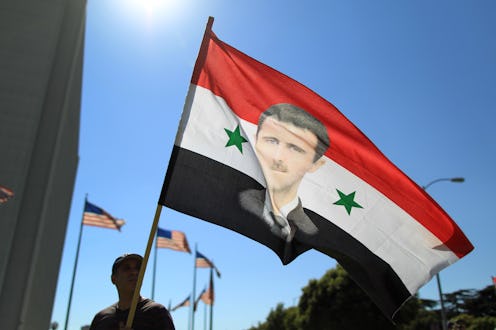News
Syrian Peace Talks Falling Apart Before They Begin
OK, so Syria's had a bad week, thanks to a fast-spreading polio outbreak and President Assad firing his deputy prime minister. But Western diplomatics have been tentatively hopeful about the prospect of peace talks in Geneva between Nov. 22-24, which would see Syria's government, rebel alliances, and Western powers all trying to come up with a compromise for the country's future. Things seemed on track: Syria met their Oct. 27 deadline for submitting a detailed account of their chemical weapons program, as well as a "general plan of destruction" for the weapons. And then... it all fell apart.
First off, the U.S. and Russia aren't getting along (surprise!) because they can't decide who to invite to this peace party. The two powers can't figure out what the role of European, American and Middle Eastern coalition should be in the talks, and the issue flared up last week when American and Russian diplomatics met up in London to talk peace talk strategy. Regardless, America pushed forward and announced that the meeting should be largely bilateral: One coalition from the Syrian regime should make an appearance, plus one from the opposition (led by the Syrian National Coalition) to represent the citizens. Unfortunately, Russia, a longtime ally of Syria, wants the opposition coalition to be made up of several delegations, including some key voices "tolerated by the government." But the London talks concluded in a "bilateral" announcement anyway, and that really made Russia angry.
"The Russians are furious at the strong stance taken in London," a Western official said.
Not to mention, even if the opposition coalition is sorted out, they might not even show up: The main Syrian rebel alliance is promising to boycott the talks if one of the Geneva conference's main goals wasn't to end President Bashar Assad's regime.
"We want this bloodbath to end, but we want a clear guarantee this Geneva II will end the war in Syria, that Bashar al-Assad will have no future in Syria or any kind of solution," said Louay Mokdad, a spokesman for the Supreme Military Council, which, although democratically-minded, includes other rebel bands that would push for an Islamic state.
Fair is fair, and Secretary of State John Kerry, who's helping to organize the talks, totally hears you, Mokdad. But demands on world powers — which will likely include China, Russia and other European nations — to ensure that they'll kick Assad out stat might be a bit of a stretch. Especially considering that Robert Ford, State Department's go-to-guy on the Syria peace process, doesn't believe a military solution is right for the crisis.
And then Syria's Deputy Prime Minister, Qadri Jamil, was fired yesterday, so that sort of puts a hole in the Syrian government's coalition. In a meeting with Ford in Moscow last week, then-deputy-PM Jamil suggested a few proposals that Ford wasn't keen on, and then tried to talk his way into being a member of the opposition coalition in the Geneva talks. Assad, who had suspicions that Jamil was a member of the "patriotic opposition," sacked him for leaving Syria without permission and holding meetings without approval.
And then — and then! — there's Assad himself, who refuses to talk peace until foreign powers (which, oops, include America's own CIA) stop arming the rebels. But then again, he's never officially RSVP'd to the Geneva talks anyway, although a pardon to political prisoners that he issued Tuesday is one of the preconditions to peace talks.
"No one inside Syria supports Geneva II," said activist Badawi al-Mugarbil, based in Homs. "How will the rebels and the murderer sit on the same table, while blood is still being shed all around Syria?"
Well, al-Mugarbil, it's not really clear if there's going to be a table at all...
